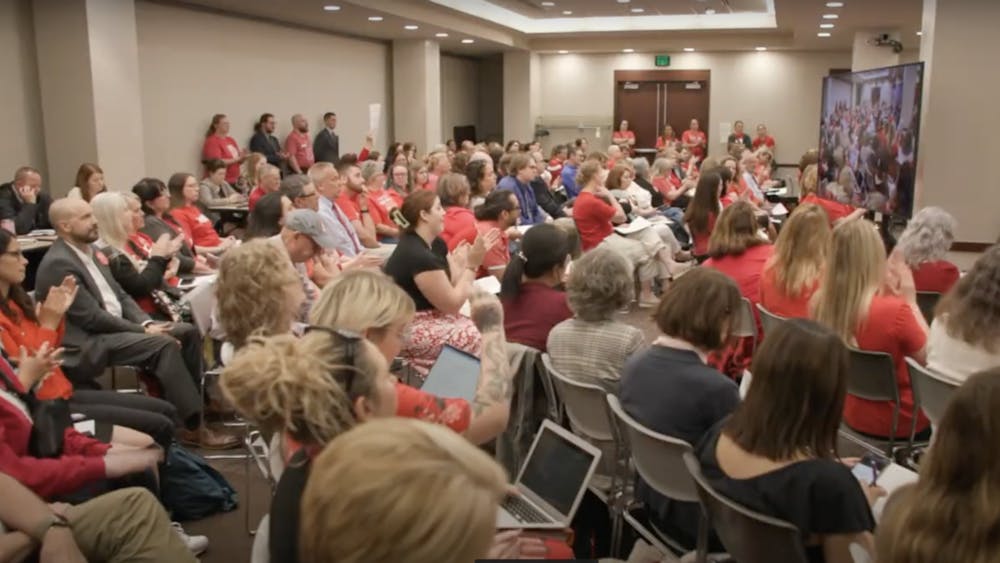A local health care center has sued IU for denial of disclosure of information after a six-month battle for worker's compensation claims. The lawsuit also alleges an IU Vice President with conflicting interests engaged in negotiations.\nFirst Health Care, located at 100 North Curry Pike, filed suit against IU President Adam Herbert and trustees Nov. 16 in Monroe County's Sixth Circuit Court. In the suit, the company claims the University failed to adequately fulfill an April 30 request for public records regarding IU's worker's compensation claims, which are handled by Bloomington Hospital. \nLegally, IU is a public company, so funds spent by the University derive from taxpayers.
The RFP and Conflict of \nInterest\nThe dispute arose in November 2002 when IU's purchasing department issued a Request for Proposal, or RFP, soliciting health care providers to submit bids for University employees' worker's compensation cases. First Health Care and Bloomington Hospital were two companies to submit bids. In December, it was announced that Bloomington Hospital had won the contract.\nWhile negotiating with bidders, the purchasing department was supervised by University Associate Vice President for Human Resources Dan Rives, who at the time was also a member of Bloomington Hospital's Board of Directors. Tom Berry, First Health Care's attorney, said Rives' role in the bid process was unfair and unethical.\n"He was wearing two hats," Berry said. "Those two hats represent a conflict of interest. It's pretty hard to negotiate with yourself and get a good deal."\nAccording to the suit, Rives had been negotiating privately with Bloomington Hospital for the worker's compensation contract since June 2002. \nBut University Director of Purchasing Guy De Stefano said those involved in the bid process were "aware" of Rives dual roles, but considered his involvement minimal.\n"Was there an awareness? Yes," De Stefano said. "We knew he was on the board, but he wasn't part of the process so it wasn't an issue for us."\nAccording to the purchasing department's conflict of interest policy, "an individual should not be in a position to gain personally as a result of conducting business on behalf of the University."\nFollowing the announcement of Bloomington Hospital's successful bid, the University conducted an internal audit of the bid selection, and subsequently Rives was not reprimanded. Rives did not return phone messages by press time.
Original Documents\nApril 30, after the internal audit, First Health Care Administrator Lee Erickson submitted a request for information to the University, a practice guaranteed under the Indiana Access to Public Records Act. Erickson, on behalf of First Health Care, asked IU Counsel Frapwell for "records of every kind" pertaining to University payments to Bloomington Hospital, including the original worker's compensation claims. \n"The public records requested are needed in order to hold the University accountable ... and to determine whether Indiana taxpayers have been overcharged for these services," the lawsuit states. \nInstead of original documents, the University sent summaries of payments made to the Hospital, claiming disclosure of the original documents would violate employees' privacy rights protected by the Health Insurance Portability and Accountability Act, or HIPPA. \n"I think we did provide documents to them earlier that we hoped would provide the information that they wanted, but they found that unacceptable," Frapwell said. "In no way do we want to release information regarding our employees' health care information."\nBut according to several request letters written by Erickson, First Health Care asked the University for the original documents with employee-sensitive information redacted, or blacked out, a practice required under HIPPA.\nThere is some dispute as to whether the University even has the original documents in question. \nIn a letter to Erickson, Sept. 9, Frapwell said the University found "no further memoranda, mail, e-mail or records of other kinds" that had not already been provided to First Health Care. Frapwell said she's not sure if the original claims exist in paper or electronic form. \nBerry said regardless of whether the documents exist, the University's actions are negligent.\n"If they don't exist, it raises a very troubling issue," he said. "How does the University know it's getting a fair return for its medical dollar if they don't know what they're paying for each procedure? It makes no sense that they wouldn't have that information. Somebody's got it."
Mediation\nIn response to the confusion, Erickson wrote to a staff attorney in the State Office of the Public Access Counselor, an independent mediator, for assistance. The office ruled in a letter to Erickson and Frapwell that First Health Care was entitled to all information not protected under HIPPA.\n"If access to a public record would reveal disclosable and nondisclosable information, the information that is disclosable must be made available for inspection and copying," the letter states.\nFollowing the decision, First Health Care petitioned IU again, but found the University's compliance unsatisfactory, according to the suit.
Tax Dollars\nAccording to the lawsuit, "the University has paid Bloomington Hospital more than $500,000 of taxpayer money for worker's compensation" since Jan. 1, 2003. Berry said his client wants to ensure the University is paying a reasonable amount for each claim.\n"If it's not, First Health Care wants to show the world IU is wasting money," Berry said. "If it is, First Health Care goes away."\n-- Contact senior writer Rick Newkirk at renewkir@indiana.edu.





